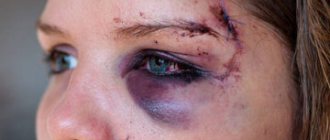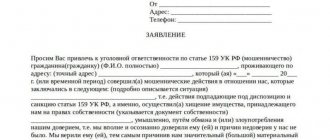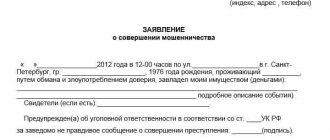Where to contact
In general, applications for damage to property are accepted by three authorities, depending on the goals of the victim. It looks like this:
- application for criminal or administrative liability - the application is accepted at the police department at the place of residence;
- if the police refuse, you can bring the perpetrators to justice and file a complaint about the inaction of the employees through the prosecutor’s office;
- compensation for damage - courts.
Important! You can submit an application to any of the listed authorities, and they must register it and take appropriate action.
Application form
There are two options to apply:
- Report the incident to the nearest police station, and they will draw up a report;
- Write in person, according to the established template.
Claims to the court are always submitted in writing, and the deadlines for filing applications in such cases are taken into account. If the established period has expired, it will not be possible to receive compensation.
Statement to the police
In fact, this is the first instance where the victim should turn. To avoid having to rewrite the application, it makes sense to familiarize yourself with the sample and the established form of completion.
The statement might look like this:
A sample application to a district police officer regarding damage to property is drawn up in a similar way, only the relevant official is indicated in the head of the document.
Filling procedure
In general, applications for liability for damage to property are filled out according to an identical scheme. The following points must be present here:
- hat - to whom (with the obligatory indication of position, surname and initials) and from whom, contact phone numbers of the victim are also indicated here;
- the main part - reflects the essence of the claim, the facts are presented in dry, official language;
- the requirement is to bring the perpetrators to criminal or administrative liability.
At the bottom of the application is the date of writing, the applicant’s signature and a transcript.
At what age can they be attracted?
Current criminal legislation provides that liability for damage or destruction of property begins when a citizen reaches the age of 16. In the presence of aggravating circumstances that lead to injuries, liability begins at the age of 14.
Please note! The type of punishment, as well as its duration, is applied by the court depending on the degree of guilt of the attacker, as well as the amount of damage caused. Only the personal property of citizens is the subject of a criminal attack. This can be either movable or immovable property.
How to write a police report about property damage
The legislative framework provides protection for the safety of property values of Russians from attacks by criminals. When committing a crime, every citizen has the right to file a statement with the police about damage to property; a sample can be taken at the department. Correct execution of the document will facilitate the investigation procedure and allow the culprit to be punished.
Contacting the police.
A number of property assets are in the personal possession of Russian citizens:
- real estate;
- personal vehicles (cars, motorcycles, mopeds, scooters, etc.);
- antiques, paintings by famous artists and other interior items.
Intentional or unintentional violation of their integrity is defined by law as damage. It can have 2 degrees:
- Partial. It manifests itself as incomplete damage to property with the possibility of restoration through repair or restoration.
- Full. Expressed by final destruction or destruction.
Federal laws.
Intentional damage to property belonging to individuals is regulated by Article 167 of the Criminal Code of the Russian Federation. The legislative act specifies the sanctions imposed on the offender when his guilt is confirmed in court.
Responsibility and penalties for unintentional damage to personal property of citizens are discussed in Art. 168 of the Criminal Code of the Russian Federation.
To open a criminal case regarding the crime in question, it will be necessary to estimate in monetary terms the amount of harm caused. Procedural proceedings begin in the following cases:
- the cost of property damaged as a result of the deliberate actions of the offender is at least 2,500 rubles;
- damage caused unintentionally is estimated at an amount exceeding 250 thousand rubles.
In Russian legislation, property damage means causing damage to someone else's property. Based on the nature of the offender’s actions, damage is divided into intentional and unintentional, and based on the amount of financial losses - into causing minor and major losses.
Damage to property.
Intentional damage
Criminal intent consists of deliberately causing harm, destruction or destruction of property belonging to individuals. If an attacker does not realize the illegality of his actions and the likelihood of damaging someone else’s property, Article 167 of the Criminal Code does not apply to him.
The legislation of the Russian Federation provides for the punishment awaiting an offender who intentionally causes damage to the personal property of citizens:
- fine up to 40 thousand rubles. or withholding three months' earnings in favor of the state budget;
- unpaid correctional labor;
- administrative arrest or imprisonment for up to 24 months.
If criminal actions related to damage to property led to the death of a person or other serious consequences, the perpetrator is convicted under clause 2 of Art. 167 of the Criminal Code of the Russian Federation and sentenced to 5 years in prison. A similar amount of punishment awaits attackers who cause damage to someone else’s property for hooligan reasons. The same sanctions are imposed when a crime is committed in a socially dangerous manner.
Damage to someone else's property.
Damage to property due to negligence in the Criminal Code of the Russian Federation is regulated by Article 168. Unintentional damage occurs as a result of a fire, explosion, car accident and other situations not related to purposeful actions. An offender found guilty by a court under this article will face the following sanctions:
- Fine to the state budget. The amount is determined based on the results of the procedural proceedings. The maximum amount is the annual salary of the defendant or 120 thousand rubles.
- Unpaid work - forced labor for up to 12 months or correctional work for up to 2 years. In some cases, the judge imposes a sentence of 480 hours of compulsory voluntary work.
- Imprisonment or restriction of freedom for a period of up to 12 months. Such sanctions await the offender who, through careless actions, has caused damage on an especially large scale.
We invite you to read: Real estate valuation for tax purposes diploma
How to assess damage
To make a decision on the case under consideration, the injured party will need to provide human rights authorities with information about the price of the destroyed property or the cost of restoration work.
In situations with arson, flooding of apartments, and intentional damage to cars, it is recommended to use the services of experts. After the survey, appraisers clarify the amount of losses.
Estimation of the amount of damage.
If the damage is minor and paying for an expensive examination is not practical, the victim can himself assess the extent of damage to personal property. To do this, you will need to find similar items for sale and find out their market price or present copies of receipts and certificates of acceptance of restoration work.
Corpus delicti
Deliberate actions to damage someone else's property are recognized as a crime if financial losses exceed 2,500 rubles. If, as a result of the procedural proceedings, the perpetrator is acquitted, the victim has the right to initiate a civil claim for compensation for moral and material damage. Administrative punishment provides for compensation for damage.
The police are the first authority to receive information about criminal activities. There are 2 ways to report an offense:
- Oral. The victim goes to the nearest police station and explains to the officer on duty the circumstances of the incident. The employee records the testimony in the protocol.
- Writing. The citizen writes a statement according to established standards. A sample must be provided at the department.
Sample crime report.
The structure of the application includes the following sections:
- In the upper corner on the right are the details of the authority of appeal (number and address of the police station, rank, surname and initials of the chief), below - the applicant’s data (full name, place of residence and registration, telephone number for contact).
- Document's name. In the center of the page, in capital letters, write “Statement of property damage.” There is an indent of one line between the name and the header.
- Description. In the most voluminous part, the circumstances of the incident are stated in business language.
- Requirements. Referring to legislative acts, they express a request to take appropriate measures to criminally or administratively punish the offender.
- Conclusion. Contains the date of filing the application and the signature of the victim.
The document is accompanied by the results of an examination to assess the cost of damaged property, estimates for restoration work or checks for payment for repairs.
Since the statute of limitations for cases involving damage to someone else’s property is limited to 3 months, it is recommended to report to the police immediately if damage is detected.
Application processing time.
Such applications are considered by human rights officials without delay. If the accusations are justified, operational measures are taken to investigate the offense.
The police are given time to verify the information received. The minimum period for analyzing information is 3 days. If additional research and examination is required, the period is extended to 30 days.
Where to contact
Depending on the tasks that the victim sets when contacting law enforcement agencies, the application is sent to one of the following authorities:
- the police bringing criminals to administrative or criminal liability;
- the prosecutor's office, which receives complaints about the inaction of police officers if they refuse to respond to an appeal;
- judicial authorities considering claims for compensation for damage.
To the local police officer
The appeal is made by drawing up an application using a sample similar to the document submitted to the police. In the header, instead of information about the head of the department, the data of the district inspector is indicated, including rank, position, surname and initials.
Contact the local police officer.
The narrative includes the place, time and detailed circumstances of the crime. The style of presentation is informational, without emotional overtones or expression of hostility towards the culprit.
It is advisable to write reliable information about the alleged attacker, for example, full name or address.
To the prosecutor's office
Citizens who have been refused by police to investigate a crime involving property damage can send a complaint to the prosecutor. There is no established form for filing such an appeal; it is recommended to adhere to the uniform standards accepted by legal practice.
Contact the prosecutor's office.
The prosecutor's service has 7 days to consider the application. If additional verification is necessary, the deadlines are extended to 30 days.
If the victim wants to compensate for financial losses and moral damages, a lawsuit is filed. The registration rules are specified in Art. 131 Code of Civil Procedure of the Russian Federation. Documents drawn up in violation of established standards are returned to the plaintiff for revision.
The law places responsibility for the illegal actions of juvenile hooligans involving damage to property on parents. Guardians are responsible for orphans.
We invite you to read: Children’s property during divorce: management of a child’s property by parents
Punishment for causing damage to someone else's property awaits any citizen of Russia who has reached the age of 16. According to current legislation, teenagers over the age of 14 who commit a crime under aggravating circumstances are brought to criminal responsibility. Such cases include damage to property associated with harm to human health or life.
Age for prosecution.
Anyone guilty of damaging or destroying someone else's property will face administrative or criminal punishment. The first is provided for minor damage and provides for a fine of 300-500 rubles.
The second is regulated by Articles 167 and 168 of the Criminal Code of the Russian Federation. The most severe punishment is provided in case of harm to health or death of a person.
Upon completion of operational activities, the police establish the offense and identify the person responsible. In this case, procedural proceedings are initiated. The victim will need to file a statement of claim.
The instance of appeal depends on the amount of damage: if the amount of losses does not exceed 50 thousand rubles, the claim is submitted to the magistrate’s court; in case of a larger amount of damage, the case is considered by district and city departments.
Consideration of the application in court.
Appeal to the Prosecutor's Office
According to the Federal Law on the Prosecutor's Office, this body is charged with monitoring compliance with laws by citizens and government bodies. Therefore, if contacting the Police did not lead to the expected result, you can file a complaint with the Prosecutor’s Office.
Current legislation does not impose special requirements for documents addressed to the prosecutor. Therefore, they can be compiled in any form.
However, legal practice, taking into account the general principles of office work, has developed the following approach to the content of an application or complaint submitted to the Prosecutor's Office:
- the document is drawn up in writing by hand or in typewritten text on a piece of A4 paper;
- in the upper right corner of the sheet the position of the prosecutor, his class rank, surname and initials are indicated;
- the name of the territorial unit of the Prosecutor's Office, its address, including the name of the locality, the name of the street and the number of the building where it is located. You must contact the Prosecutor's Office, which is located in the area where the offense was committed. Consequently, the place of residence of the applicant and the place where the offense was committed may not coincide. Therefore, if this rule is not followed, the documents will be redirected for consideration by territoriality. 7 days are allotted for this, of which the applicant will be notified in writing;
- below, on the same right side, information about the applicant is indicated, including his last name, first name, patronymic, residential address, means of communication in the form of a telephone number, email address;
- the name of the document is written in the middle - “Application” or “Complaint”;
- the factual circumstances of what happened, as well as the reason for contacting the Prosecutor's Office, are set out on a new line;
- the essence of the stated appeal in the form of a request to conduct a prosecutorial investigation, to take measures to protect the rights and legitimate interests of the applicant; take prosecutorial response measures; provide assistance in restoring violated rights. An appeal to the prosecutor must contain complete information on the issue initiated, references to the rules of law and other legal acts that were violated;
- the appeal ends with a reference to the list of attached documents, if any;
- at the end - the day, month and year of the document, the signature of the applicant, his surname and initials.
If a written request is made by hand, the text must be readable. Otherwise, the document may be returned to the author for legible writing. Obscene language and offensive statements must be excluded. Threats are unacceptable, as this may lead to the initiator of the appeal being held accountable.
Application processing time
The law allows 7 days for a preliminary decision.
This means that during the specified period of time the Prosecutor’s Office can make one of the following comprehensive decisions:
- accept the application for consideration on its merits;
- leave the application without consideration, indicating the reason for such a conclusion;
- transfer the received documents to the lower Prosecutor's Office for consideration by territoriality;
- send materials to another law enforcement agency for consideration on the merits;
- stop considering the appeal;
- attach documents to the previously received application;
- return the documents to the applicant.
The prosecutor is given 15 days to make a final decision on citizens’ appeals. If additional verification is required, it must be completed within 30 days.
Remember! Based on the results, the prosecutor makes one of the following decisions:
- satisfy the applicant’s appeal and take measures to fully or partially restore the violated rights;
- satisfy the repeated appeal against the previous decision of the relevant Prosecutor's Office;
- recognize the applicant's demands as unfounded and reject their satisfaction;
- explain to the applicant legal issues regarding further actions;
- send an application to another Prosecutor's Office or department;
- return the documents to the applicant;
- leave a statement without permission;
- stop further correspondence with the applicant;
- attach materials to supervisory proceedings.
Watch the video. Damage to someone else's property:
Further actions
Based on the statement of the victim, the criminals are brought to justice, however, the essence of the victims’ claims usually lies not only in fair punishment for the perpetrators, but also in compensation for their own losses. To do this, you need to re-apply to the court that heard the case with a claim for financial compensation.
Let us look at a number of nuances that you need to know when applying to the courts.
To receive compensation, you must provide the court with information about the value of the damaged or destroyed property. In cases where we are talking about arson, flooding of apartments, or intentional damage to vehicles, you need to contact an independent expert company. Appraisers will determine the current value of the item, and the report prepared by such organizations is accepted by the court as unconditional evidence.
However, there are often situations when the damage caused is insignificant, and the costs of expert services far exceed the actual damage. Here you will have to act independently, providing as evidence data on the price of property with similar characteristics or receipts for expenses incurred for restoration.
Important!
If a claim for compensation is filed during investigative actions, payment of state duty is not required. This practice does occur. If the accused does not agree with the plaintiff's demands, he has the right to challenge the amount of compensation by filing a motion to reconsider the case. Let us immediately note that this is a very labor-intensive process, and the applicant will most likely be required to provide reasoned justification for the legal proceedings.
What to do if you are acquitted
Sometimes the court does not find the elements of a crime in the actions of the accused of causing property damage. In this case, criminal punishment is no longer provided, however, civil liability is not removed. Consequently, the perpetrator can be held civilly liable and the losses incurred can be recovered.
Refunds can be denied only in two cases:
- the damage was caused by a natural disaster or military action;
- the damage was caused for reasons beyond the control of the perpetrator.
Such refusal for the stated reasons is final and is not subject to appeal.
Sample lawsuit
A claim for compensation for damage caused is drawn up according to this sample.
Therefore, damage, and even more so the destruction of personal property by a stranger, is perceived very harshly by the owner, even if the value of the damaged item is small.
What to do if your property has been damaged by someone? There are several options.
Where to contact?
Depending on the amount of damage and the circumstances under which it was caused to the victim’s property, the act is classified under the criminal or administrative code. In addition, when it comes to a poorly performed service, the law on consumer rights is involved.
Damage or destruction of someone else's property on a large scale, committed intentionally (deliberately), is punishable by Article 167 of the Criminal Code of the Russian Federation.
- For accidental, that is, caused by negligence, damage or destruction of property, the penalty is specified in Article 168. If an act committed against your property falls under this article, you should also contact the police.
- When the value of the damaged property is small (up to 2,500 rubles), but you still want to punish the offender, you should write a statement to the police, but with a request to bring the offender to administrative responsibility.
- The prosecutor's office is usually contacted when a complaint about property damage has been refused at the police station.
- In order to receive compensation for your damages, you must file a claim in court. In principle, compensation for damages can also be considered during a meeting dedicated to a criminal case. But in order to be sure to receive compensation, you should still take care of it.
Next, we will talk about the form for reporting property damage to the police.
Document form
- When it comes to a statement sent to the police, you should know that you do not have to write it, especially in advance. When you arrive at the department, you can tell the employee about what happened, after which he will draw up a protocol from your words, which you sign.
- If you want to personally make sure that the application will definitely get the case moving, you can write it according to the sample provided by the police or fill it out at home by finding the appropriate form on the Internet. After submitting it, ask for the corresponding coupon.
- Otherwise, the situation will be with the claim. This paper must be submitted in writing. In addition, in order for it to be accepted for consideration, it is necessary to comply with the requirements established by law and the deadlines for filing an application for damage to property.
We invite you to read: Complaint to a supplier about a low-quality product: Sample quality complaint
How to compose?
As is clear from the previous section, a statement and a claim are drawn up differently. Let's consider the principles of their creation separately.
In principle, both an application for administrative liability and an application for a crime are created according to the same template:
- “Hat” is written at the top right. It is indicated to whom the application is addressed (full name, title and position of the head of the department), as well as from whom it was received. Here, in addition to personal information, you must provide contact information so that you can be contacted;
- Descriptive part. Here you need to succinctly and briefly state the essence of the matter. Just the facts. There is no need to describe your emotions;
- Actually a request (for prosecution, capture, etc.). In an administrative case, the requirement may also be indicated at the beginning of the descriptive part.
- Signature with transcript and date.
For sample applications to the district police officer regarding damage to property and theft, see the appendix.
Sample statement to the police - 1
Sample statement to the police - 2
Lawsuit
The statement of claim shall include the following information:
- The name of the court to which this paper is sent;
- Details of the plaintiff;
- Information about the defendant, his location;
- The essence of the appeal;
- Grounds;
- Cost of claim;
- An indication of compliance with pre-trial measures (that is, contacting the defendant for the purpose of reconciliation before filing a claim);
- List of attached papers;
- Date and signature.
In addition, in order to achieve a better result, you can use the following instructions:
- It is advisable to present events in chronological order. This way the narrative turns out to be more complete and accurate, better reflecting the real course of events;
- The facts must be presented concisely and completely. The feeling of reticence that arises after reading will raise the suspicion that you have hidden something;
- Divide the text into paragraphs according to the events being presented;
- Don't jump from thought to thought;
- If you doubt the jurisdiction of a case, do not indicate the norms of law you are referring to. They will be specified in court.
An example of a claim containing a request for compensation for damage as a result of an accident can be found below the article. There you will also find a statement of claim for consumer protection.
Sample statement of claim for damage to personal property
Sample statement of claim for damage to personal property - 1
Sample statement of claim for damage to personal property - 2
Sample statement of claim for damage to personal property - 3
Sample statement of claim for damage to personal property - 4
Features of preparing a claim for compensation for moral and material damage
If necessary, the injured party has the right to draw up a single statement of claim for compensation for both material and moral damage. In this case, the essence of the violation is indicated only once in the document. This approach is often practiced when collecting compensation for damage caused during a crime or in an accident.
Thus, a sample application for payment of moral and material damage from a criminal act contains the following points:
- name of the court;
- information about the participants in the proceedings;
- the essence of the precedent with a description of the crime, the harm caused and the moral suffering that follows;
- links to legislative acts;
- demand for compensation for property and moral damage, indicating specific amounts;
- list of attached documents;
- date of;
- signature.
The petition is certified by the date of its preparation, as well as by the personal signature of the plaintiff.
How to bring the perpetrators to justice
According to the current Criminal Code, liability for the accused is provided for under two articles:
- deliberate actions resulting in damage/destruction of someone else's property (Article 167). Punishable by a fine of up to 40,000 rubles or detention for 2 years. If these actions resulted in serious consequences or the death of a person, the accused may face up to 5 years;
- unintentional actions that caused damage/destruction of someone else's property (Article 168). The culprit may face a fine of up to 120,000 rubles or imprisonment for up to 12 months.
First, you need to contact the police department with a statement about damage to personal property. Within 3 days, law enforcement officials must draw up a protocol confirming the fact of the offense. If the amount of damage caused exceeds 5,000 rubles, a criminal case is opened.
Liability for property damage
The law of the Russian Federation provides for criminal and administrative liability for causing damage to someone else's property.
Which jurisdiction a particular case falls under is determined by the size of the loss and the intentions of the attacker. A crime can be committed intentionally, out of hooligan motives or for other purposes. This is regulated by Article 167 of the Criminal Code of the Russian Federation. Or the harm may be caused unintentionally, for example, due to negligence or due to an accidental coincidence; the penalty is specified in Article 168 of the Criminal Code of the Russian Federation. In the administrative code, Article 7.17 of the Code of Administrative Offenses is responsible for this.
Damage to property can be partial, when repairs can restore the function of the object. If the item is completely damaged, it cannot be restored.
Criminal liability applies to cases where the loss was caused in the amount of:
- 2,500 rubles if the crime is intentional;
- 250,000 rubles if there was negligence.
If the amount of loss is lower than specified, then the illegal action is regulated by the administrative code.
The age at which responsibility begins is 16 years. In case of criminal liability, the court may impose the following penalties, depending on whether premeditation has been proven:
- payment of a fine of up to 120 thousand rubles;
- arrest for up to 2 years;
- public Works;
- deduction of wages for the year.
Administrative responsibility
Citizens who cause damage amounting to less than 5,000 rubles are held administratively liable. This may include the following offenses:
- broken glass in the entrance/apartment;
- broken dishes in catering establishments;
- small scratch on the car;
- damage to clothing.
Important! The limitation period for such claims is 3 months. If the period has expired, the paperwork is terminated, the degree of guilt of the suspect is not clarified.
Procedure for accepting applications
Complaints about property damage are accepted at the police department, and the application can be brought ready-made or drawn up at the place of application. In any case, applications are considered within 10-15 minutes, the applicant is given a coupon confirming the fact of registration.
An application may be refused in the following cases:
- there is no contact information for the victim;
- the application is submitted anonymously;
- the body of the document does not set out the facts defining the crime.
In addition, if a court decision is made on this fact of property damage, the application will also be refused.









